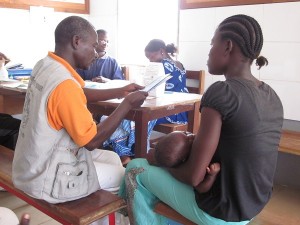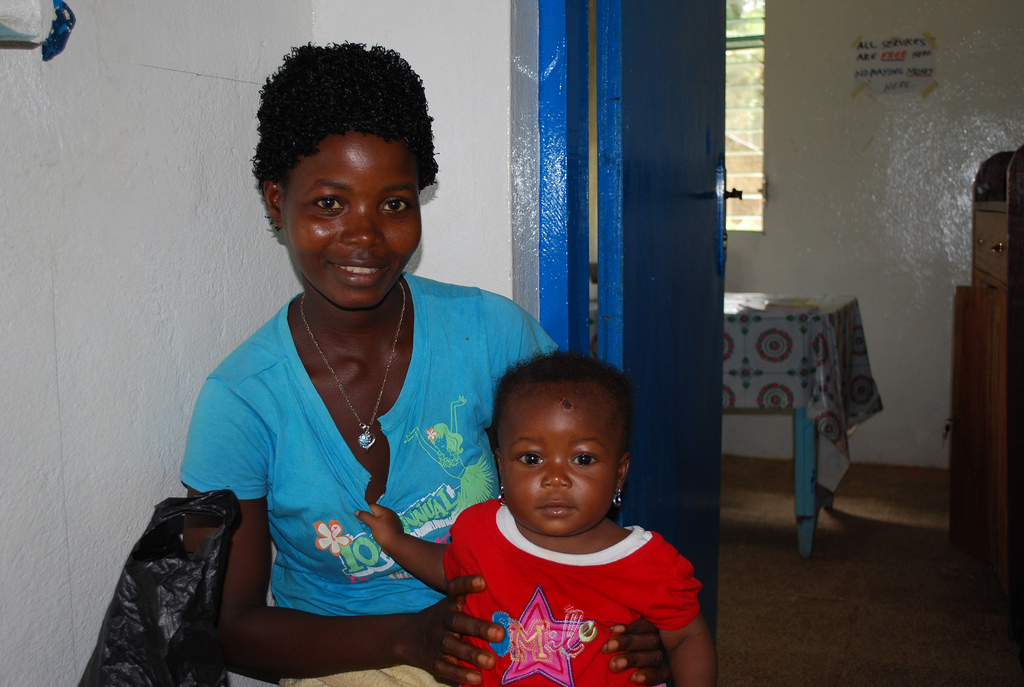This post originally appeared on the Knowledge for Health website.
When Lorpu*, a mother in Liberia, brought her baby to a clinic to receive routine immunizations, she was also counseled about family planning and offered a contraceptive method. Lorpu expressed relief about having received same-day provision of both family planning and immunization services: “When I go for [my child’s] vaccine, I can also get family planning. I don’t have to leave and come back.”
Lorpu received these integrated services as part of a pilot program in Liberia implemented by the U.S. Agency for International Development’s (USAID) predecessor flagship Maternal and Child Health Integrated Program (MCHIP) and the Liberian Ministry of Health and Social Welfare. In participating clinics, women who brought their infants for routine immunization services were provided brief messages about family planning by the vaccinator and offered a referral for same-day services. This approach, now used by MCHIP’s successor program, the flagship Maternal and Child Survival Program (MCSP), has led to substantial increases in family planning uptake, and women have expressed positive feedback about the convenience of having access to both family planning and immunization services during the same visit.
Integrated health care delivery is critical in the year after childbirth, when there are numerous opportunities to reach women and their infants with services—including postnatal care, immunization, growth monitoring, and family planning. A no-missed-opportunities approach recognizes that every service contact presents an opportunity to comprehensively address women’s and children’s health needs.
In particular, routine infant immunization visits, which provide multiple contacts

with the health system during the first year postpartum, provide timely opportunities to link new mothers with family planning information and services. Compared to other maternal, newborn, and child health contacts, immunization services are, in general, highly utilized. While the vast majority of women in the first year postpartum want to delay or avert another pregnancy altogether, unmet need for family planning among postpartum women remains high. Ensuring healthy timing and spacing of pregnancies is critical for both maternal and child health. Integration of family planning and immunization services has been recognized as a promising high-impact practice (HIP) for family planning by USAID, the United Nations Population Fund and other organizations. Opportunities for using family planning as a platform for strengthening immunization outcomes are also being explored.
Partners recognize that more data are needed to fully document the impact of family planning and immunization integration. In addition, having effective systems in place to monitor key indicators for both immunization and family planning is critical to ensuring that integration does not have a negative impact on immunization service performance or use. While more research is needed, the body of evidence supporting the effectiveness of an integrated approach is growing. For example, a recent FHI 360-led study in Rwanda found that incorporating family planning messages and services into child immunization programs led to a statistically significant increase in family planning uptake with no negative impact on immunization rates.1 Mothers who brought their children for routine vaccinations received group education, counseling, and individualized screening for family planning and were offered same-day provision of a contraceptive method.
The Family Planning and Immunization Integration Working Group, which is co-coordinated by MCSP and FHI 360, recently launched an initiative to advance a no-missed-opportunities approach, with activities geared toward country engagement, global technical leadership, monitoring and evaluation, and research. The concept of no missed opportunities has been employed by both the immunization and family planning communities and offers a point of convergence for advocacy and engagement efforts. Information on how to effectively integrate family planning and immunization services—including concrete guidance for country-level programs—is available in the Family Planning and Immunization Integration Toolkit.
As we strive to reach all mothers and children with critical health services, we must ensure that no opportunity is missed to provide integrated care. As one mother in Liberia said, “I started taking family planning. Next month, on the 15th, it will run out. It is the same day as the [baby’s] next vaccine, so I will be rushing to get the vaccine that day so I can get my family planning on time.”
*The client’s name was changed.
1. Immunization coverage in Rwanda was high at the outset of the intervention. According to 2010 Rwanda Demographic and Health Survey data, 96 percent of infants received their third dose of the diphtheria toxoid, tetanus toxoid and pertussis vaccine (DTP3) by their first birthday.Immunization coverage in Rwanda was high at the outset of the intervention. According to 2010 Rwanda Demographic and Health Survey data, 96 percent of infants received their third dose of the diphtheria toxoid, tetanus toxoid and pertussis vaccine (DTP3) by their first birthday.

